7 Ways Magnesium Improves Brain Health
Magnesium is present in all cells of the body and is involved in over 300 enzymatic processes, including energy production. Magnesium is essential for maintaining normal bone density, normal cardiac rhythmicity, normal pulmonary function, and normal blood glucose regulation. Magnesium is one of the most common world-wide deficiencies and it plays a role in most of the common health struggles people face every day. In this article, you will discover how magnesium improves brain health.
Most doctors are not trained to detect magnesium deficiencies. Magnesium deficiency is often misdiagnosed because it does not show up in blood tests as only 1% of the body’s magnesium is stored in the blood (1).
Dr. Norman Shealy’s, M.D., Ph.D. is an American neurosurgeon and a pioneer in pain medicine says, “Every known illness is associated with a magnesium deficiency,” and that, “magnesium is the most critical mineral required for electrical stability of every cell in the body. A magnesium deficiency may be responsible for more diseases than any other nutrient. (2)”
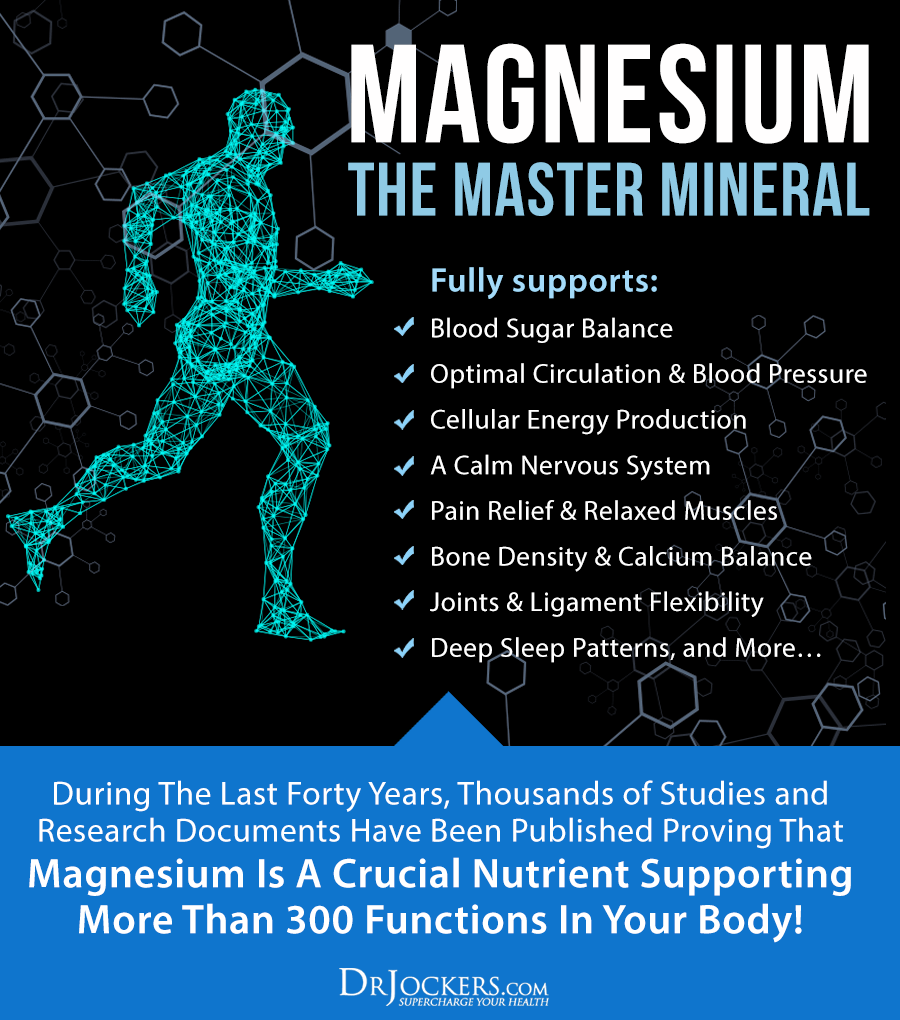
Magnesium Deficiency Rates:
Research has shown that 68% of individuals in the US do not consume the daily recommended amount of dietary magnesium and 19% do not even consume half of the RDA levels (310-420mg daily) (3). Most researchers believe this RDA level is far too low and if it was raised to where it should be we would see that roughly 80% of Americans are consuming insufficient quantities (4).
Magnesium is a basic element of life much like water and air. We need a lot of magnesium, roughly 1000 mgs/day for a healthy active individual to keep up with the demands of the body. Magnesium is to the body like oil is to a car’s engine and if we are deficient problems will arise. Consuming optimal magnesium improves brain health and all aspects of cognition.
Calcium: Magnesium Ratios:
Our current diet is rich in calcium but insufficient in magnesium. Our ancient ancestors had a a diet that was close to 1:1 whereas our present-day diets are more like 5:1 and up to 15:1. Having roughly ten times more calcium than magnesium is a serious problem (5).
This elevated calcium to magnesium ratio is a major player in conditions such as mitral valve prolapse, migraines, attention deficit disorder, autism, fibromyalgia, anxiety, asthma and allergies. Wherever there is elevated calcium and insufficient magnesium inside of cells the effects are muscle contractions, spasms, twitches and even convulsions (6).
Magnesium and Detoxification:
Without sufficient magnesium the body struggles to make and utilize protein and enzymes. It is also unable to properly methylate and detoxify and/or process and utilize anti-oxidants like vitamin C and E.
Magnesium is extremely critical for proper detoxification processes. As our world has gotten increasingly more toxic, our need for magnesium has increased. Meanwhile, the nutrition of our modern food has increasingly been diminished. This is due to overcropping, poor composting and pesticides/herbicide chemical residue which reduces nutritional quality of the soil and produce.
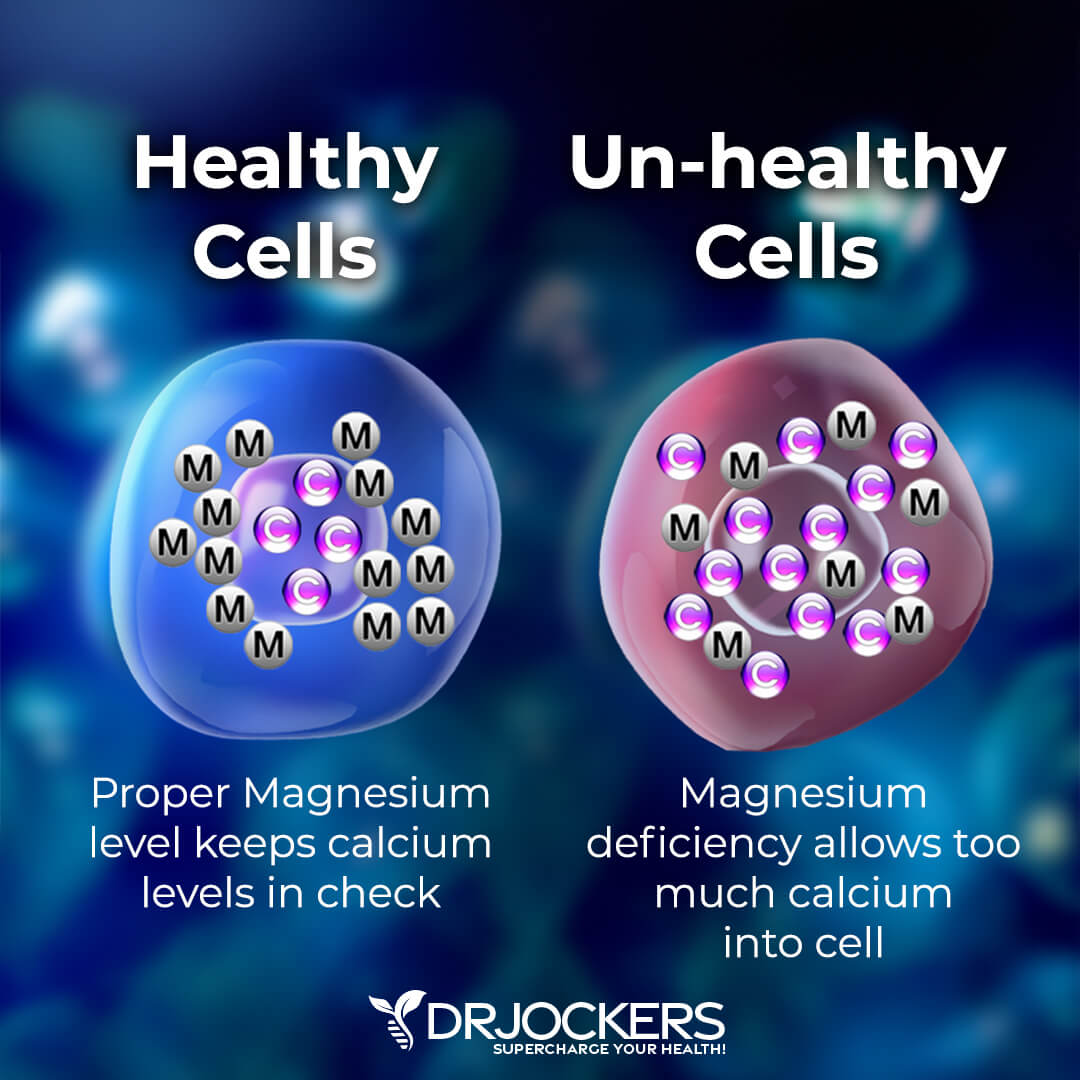
1. Magnesium Improves Brain Health and Cognition
If you fall prey to habitual symptoms of brain fog you may be deficient in magnesium. Over 300 enzymes require magnesium to perform biological reactions essential to tissue and organ function (2). Magnesium supports optimal cognitive health by maximizing the various intricate functions of the brain.
Chronic stress depletes magnesium and so keeping stress levels under control and increasing your intake of magnesium improves brain health and cognitive processing speed.
Magnesium Improves Brain Memory Formation
Critical for age-related memory loss, magnesium is associated with memory potential. Studies show that low levels of brain magnesium directly correlate to poor memory function (4).
Specifically, the hippocampus region of the brain is the primary location for retaining long term memories. Magnesium is known to strengthen the function of synapses in the hippocampus thus improving long-term potentiation. In other words, magnesium better equips the brain with the ability to retain memories over long term periods. (2)
Associated with decision making, the prefrontal cortex area of the brain aids in the retrieval of short-term memories. The effectiveness of the prefrontal cortex is largely dependent on magnesium. Magnesium also strengthens the synaptic nerve endings responsible for transmitting a response (2, 3).
Magnesium Improves Learning Abilities:
As a result of increased long-term potentiation, resulting from the repetitive stimulation of a nerve, as well as the ability for nerves to transmit signals more effectively, magnesium improves brain health and better enables an individual to improve their ability to learn.
Researchers looked to test rats using Magnesium threonate (MgT) supplementation and look at their ability to swim and find a submerged platform on which to rest. In this study, both old and young rats who were using the MgT learned significantly faster than the control group.
Amazingly, the supplemented group was able to retain their memory of where the submerged platform was hidden after 24 hours. Both young and old rats in the control group forgot and began randomly searching through the maze and took more than twice as long as the MgT supplemented group.
This meant that older MgT supplemented rats showed significantly better memory and recall than young rats who didn’t get MgT. The results showed a spatial long-term memory enhancement of 122% in younger supplemented rats and 100% improvement in older supplemented rats (2).
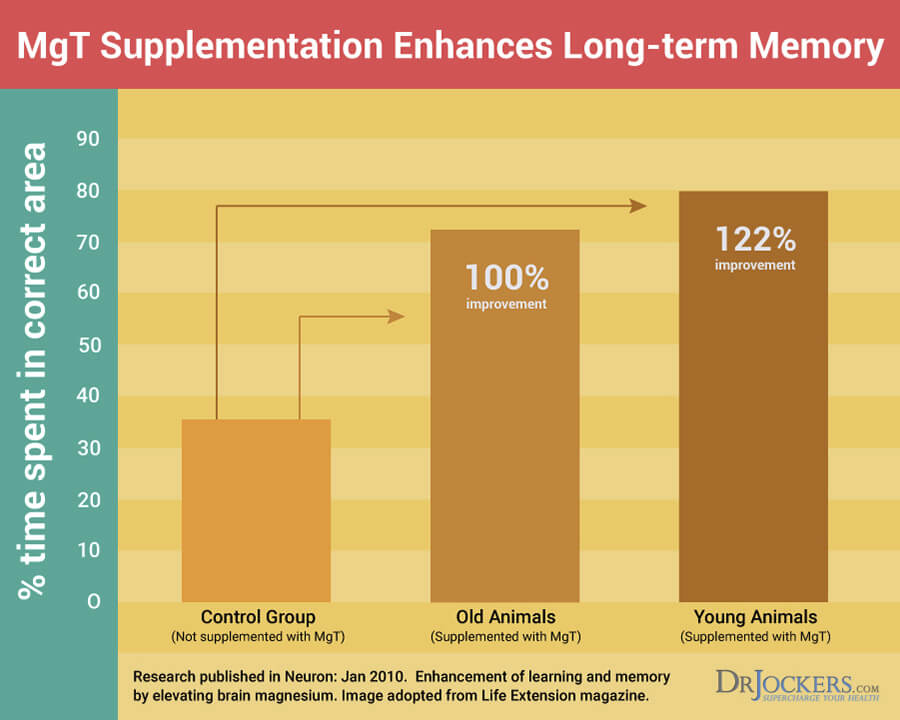
Magnesium Can Prevent Alzheimer’s
With the deteriorating health habits of our modern culture, it is not a surprise that Alzheimer’s disease is associated with decreased levels of magnesium. Toxic plaque buildup is evident in patients with declining cognitive abilities symptomatic of the pathogenesis of Alzheimer’s disease. (4)
Restoring adequate levels of brain magnesium has been found to prevent the further decline of cognitive function. One study found that the supplemental treatment of magnesium over a 17 month period reduced amyloid plaque accumulation in the hipocampus region of the brain by 35.8% and by 36% in the prefrontal cortex. Some researchers even propose that the development of the disease may even be reversed following magnesium therapy. (4)
2. Magnesium Regulates Mood and Stress
Magnesium regulates mood and stress by nourishing the nervous system. Damage to the nervous system has been implicated as the cause of numerous health concerns including dementia and depression (5).
Case studies show that treating magnesium deficiency has helped patients struggling with anxiety, irritability, confusion, hyperexcitability, postpartum depression, drug and alcohol abuse, as well as traumatic brain injuries. Magnesium has also been reported by the American Academy of Neurology and the American Headache Society as a “probably effective” treatment for preventing migraines and headaches which can be associated with stress (7).

Magnesium Therapy Treats Depression:
Known as an anti-stress mineral, cellular magnesium levels stimulate serotonin production which improves mood. Clinical studies have found that 125-300 mg of supplemental magnesium is effective at treating symptoms of depression after just one week (5).
Magnesium Therapy Treats Anxiety:
Have you ever experienced instances when you were highly reactive towards situations or people for minimal or no apparent reason? Your body may be signaling to you that your cells are deficient in magnesium. Remember, magnesium is used by our cells as a type of fuel source for biological processes to function. The higher amount of both physical and mental demands in our lives, the higher the rate our bodies deplete magnesium sources.
Magnesium therapy can treat symptoms of anxiety by relaxing nerves, assisting in digestion, relieving muscle tension, and conducting healthy nerve responses (5). Unhealthy nerve impulses in the hippocampus can cause factors conducive to stimulating fear and anxiety (3).
Magnesium therapy is not only found to strengthen the ability of nerves in the brain to function properly, but magnesium treatment also increases the selectivity of nerves to fire which reduces one’s risk of excitability and agitation (2).
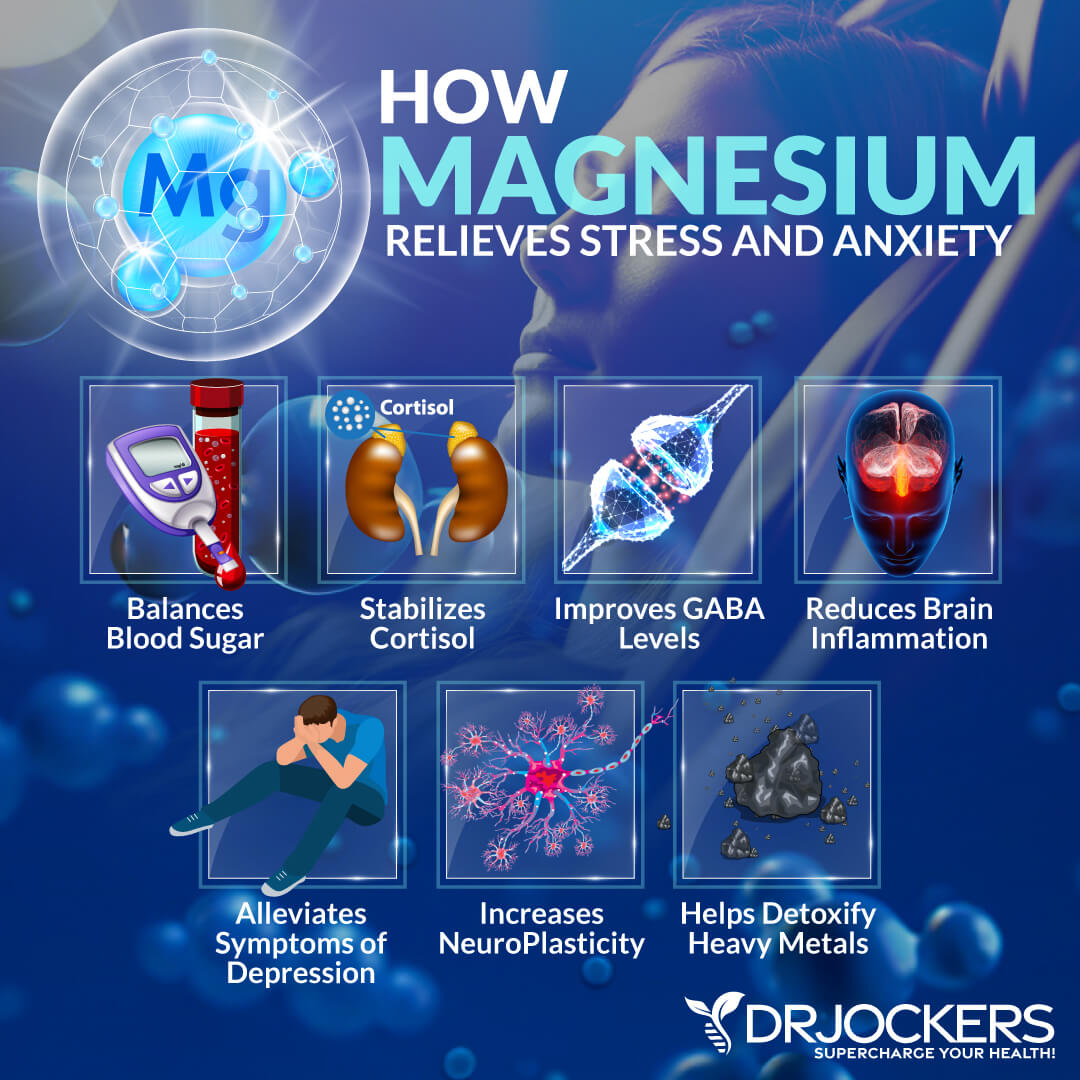
3. Magnesium Prevents Insomnia
A healthy sleep cycle is important to promoting overall health and the production of hormones which are synthesized during sleep. Magnesium may help reduce symptoms of insomnia and induce a deep restful night’s sleep.
Primarily reliant on the same factors which regulate mood and manage stress, a healthy night’s sleep is dependent on cellular magnesium concentrations. A healthy magnesium balance is needed to regulate hormones such as melatonin which in turn helps to induce sleep and decreases cortisol. Magnesium is also needed for a restful night’s sleep because it promotes muscle relaxation ensuring less of your night is spent counting sheep.
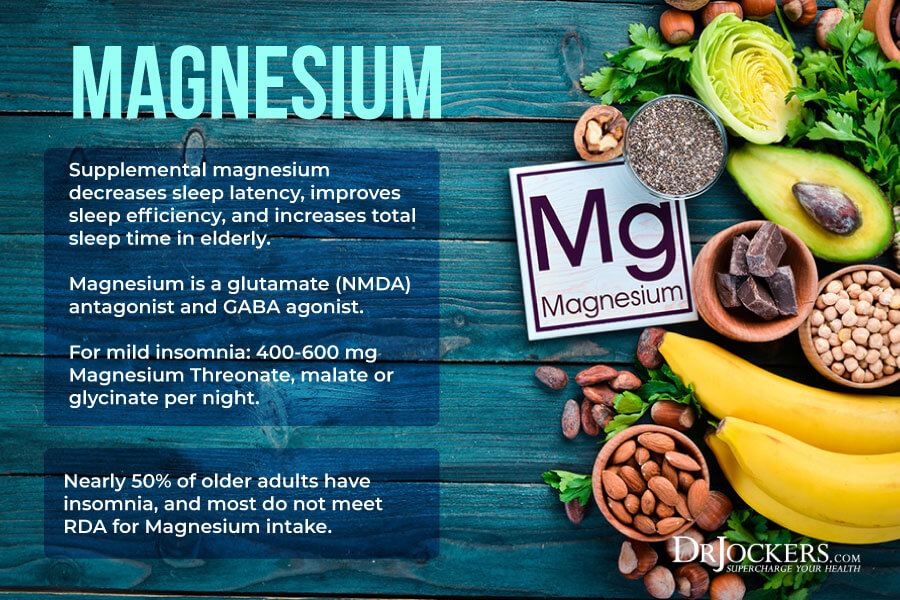
4. Magnesium Balances Blood Sugar
Magnesium is a critical component involved in the regulation and maintenance of regulating blood glucose levels. Deficiencies in magnesium impair insulin secretion and the ability of glucose to be transported into cells (7).
Poor blood sugar is damaging to the neurological tissue and stabilizing blood sugar is another way magnesium improves brain health.
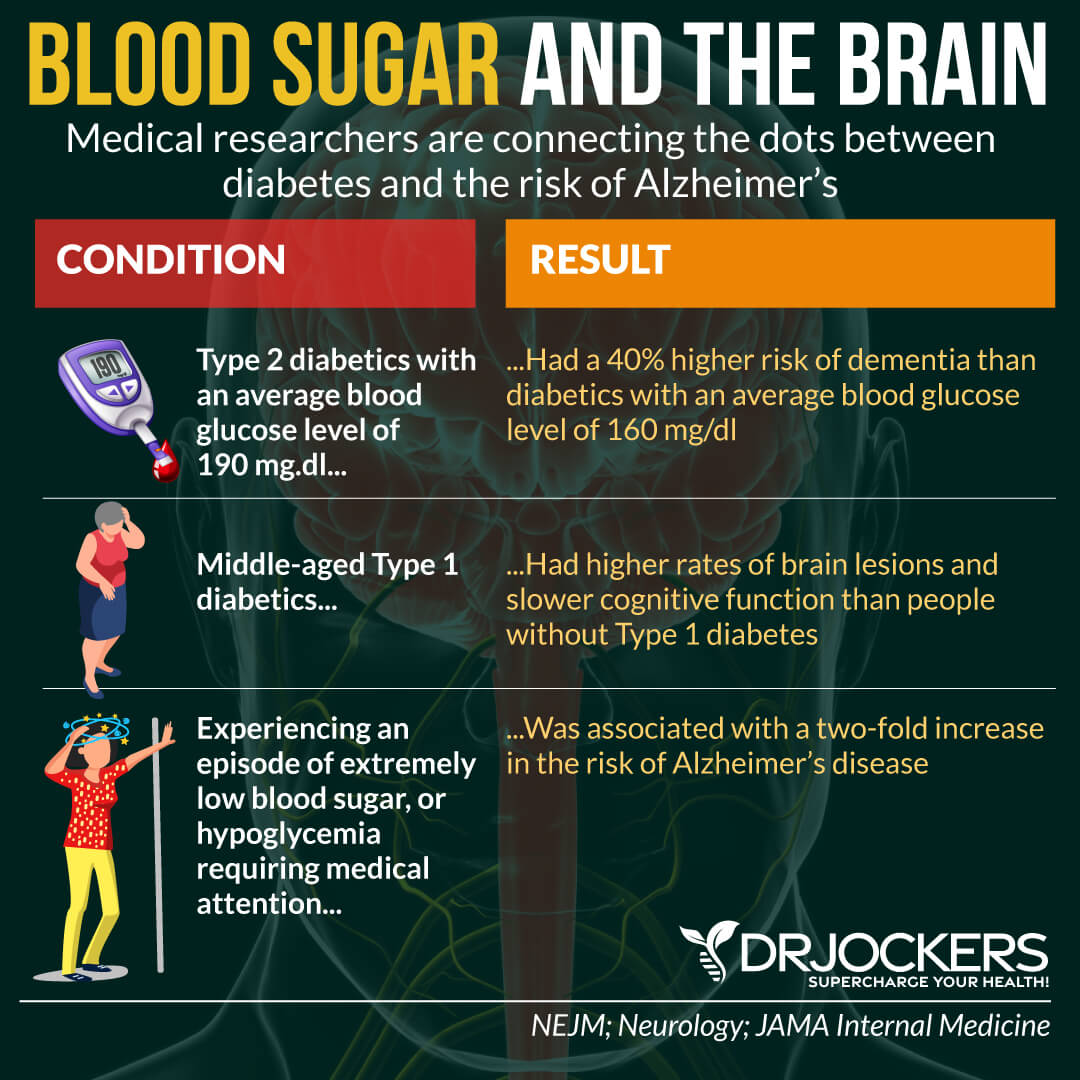
Magnesium Improves Type II Diabetes
Many studies conducted show that supplementing diet with magnesium via food or oral supplementation improves insulin secretion and response in type-2 diabetic patients (6). It is this increased concentration of glucose in the kidneys that leads to frequent urination and further promotes magnesium deficiency (7).
However, clinical testing has yet to determine if the magnesium alone is solely responsible for improved glucose control. Physicians speculate whether the improved health benefits are a result of another vitamin or mineral commonly found in food sources high in magnesium.
Regardless of the lack of scientists to directly correlate magnesium to the healthy balance of blood sugar, a decreased risk factor for developing diabetes is not to be overlooked following dietary magnesium supplementation. Individuals supplementing their diets with 1,000 mg/day of magnesium oxide after 30 days showed improved glycemic control. Other reports found that there was a 15%-23% reduction in the risk of developing diabetes following different doses of magnesium supplements. (7)
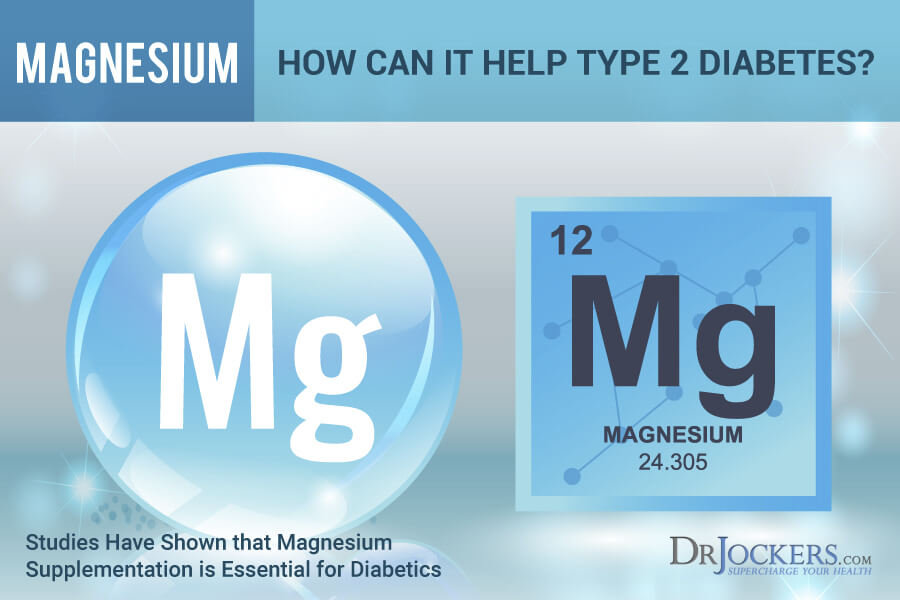
5. Magnesium Fortifies Bones and Joints
Up to 60% of magnesium is concentrated in bones and the remaining is found in soft tissue and blood. When magnesium supply is deficient in cells, the body has to search for magnesium which can affect overall health. Low levels of blood magnesium affects heart rate, nervous function, and can lead to chronic headaches. As a result of their magnesium hunt, cells are forced to pull what limited magnesium concentration is found in a delicate balance out of bone formations. (1, 7)
Calcium is not the only mineral critical to bone formation and strength. Magnesium has to be in a proper balance with calcium in order to maintain healthy bone density and is essential to bone health as we age. When magnesium is pulled from the bones resulting from cellular magnesium deficiency, the concentration of calcium to magnesium becomes too imbalanced leading to the calcification of bones and joints. Such problems lead to conditions as osteoarthritis. (7)
Limited clinical trials have found that when magnesium citrate is taken daily over long periods may prevent and possibly reverse osteoporosis (7). Women who supplemented their diets with enriched magnesium food sources over a 2 year period reportedly had fewer fractures and a decreased rate of bone loss (1).
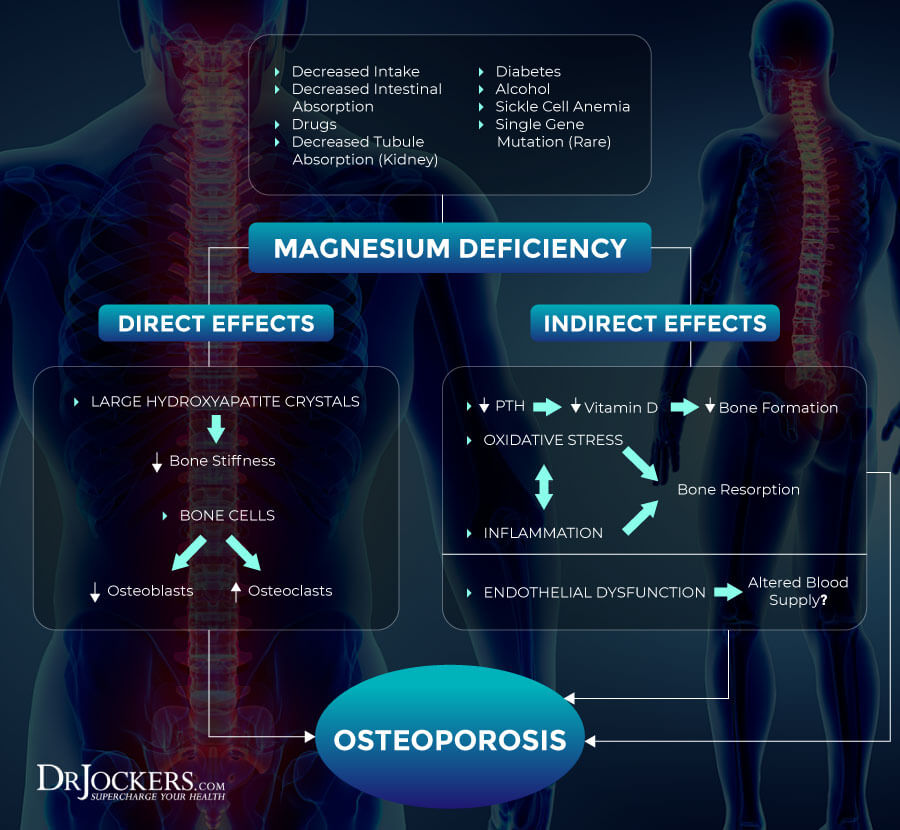
6. Magnesium Supports Heart Health
Along with calcium, magnesium also plays a critical role in its balance with potassium. In combination with these other minerals, magnesium is responsible for the function of muscle contraction and heart rhythm. As previously mentioned, magnesium assists in regulating nerve impulses and is perhaps most important in maintaining cardiovascular health. (7)
Magnesium May Lower Blood Pressure:
Magnesium is believed to balance blood pressure and improve cardiovascular health. Aside from alleviating symptoms of anxiety, relieving the restriction around blood vessels and regulating a healthy contraction of the heart may lower blood pressure (2, 7).
Better blood pressure translates into better circulation which is another way magnesium improves brain health.
Magnesium Reduces Heart Attack Risk:
Up to 250mg/day of magnesium supplementation is associated with a lower risk of cardiovascular disease and heart attack. Lower doses of magnesium supplementation was found to reduce the risk of stroke by 8% requiring further studies to analyze the link between dose dependency and results. (7)
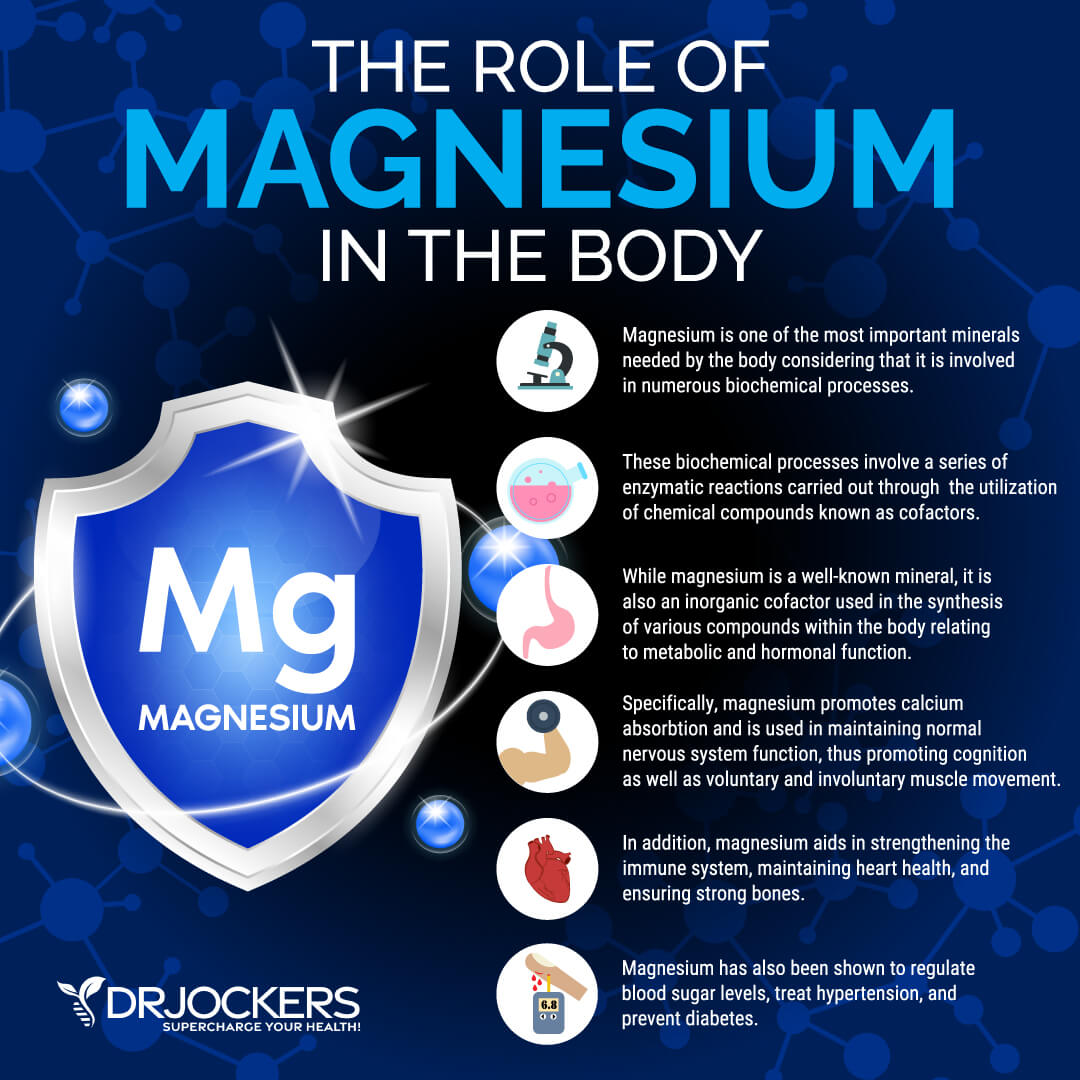
7. Magnesium Assists in Detoxification
Magnesium assists in detoxifying the body’s tissue of acids, toxins, gasses, poisons and other impurities. Environmental contaminants in our food expose our bodies to a higher amount of toxins and impurities than in the past. These impurities deplete our body of essential minerals.
Magnesium improves the motility of the gastrointestinal tract and colon and thereby stimulating the removal of contaminants by promoting a laxative effect. For this reason, magnesium is a primary ingredient in most laxatives used to relieve constipation. (7)
The gut is called the second brain and improving motility is another way magnesium improves brain health.
Risks of Magnesium Deficiency
Individuals at greatest risk of magnesium deficiency should pay special attention to health problems they are experiencing. Only 32% of Americans are believed to meet the recommended daily requirements for magnesium (2). Those at a higher risk of developing a magnesium deficiency include: (5, 6, 7)
- Crohn’s disease, Celiac disease and patients with other gastrointestinal diseases- These individuals are less able to absorb nutrients from dietary intake.
- Type-2 diabetics- A high concentration of blood glucose leads to increased urination and a higher risk of kidney damage.
- Alcoholics- Chronic alcohol abuse is likely to cause gastrointestinal problems which further promote the removal of magnesium in urine.
- Elderly- As the body ages, the gastrointestinal tract becomes less efficient at absorbing minerals. Older adults are more likely to be taking medications which can interfere with the absorption of magnesium.
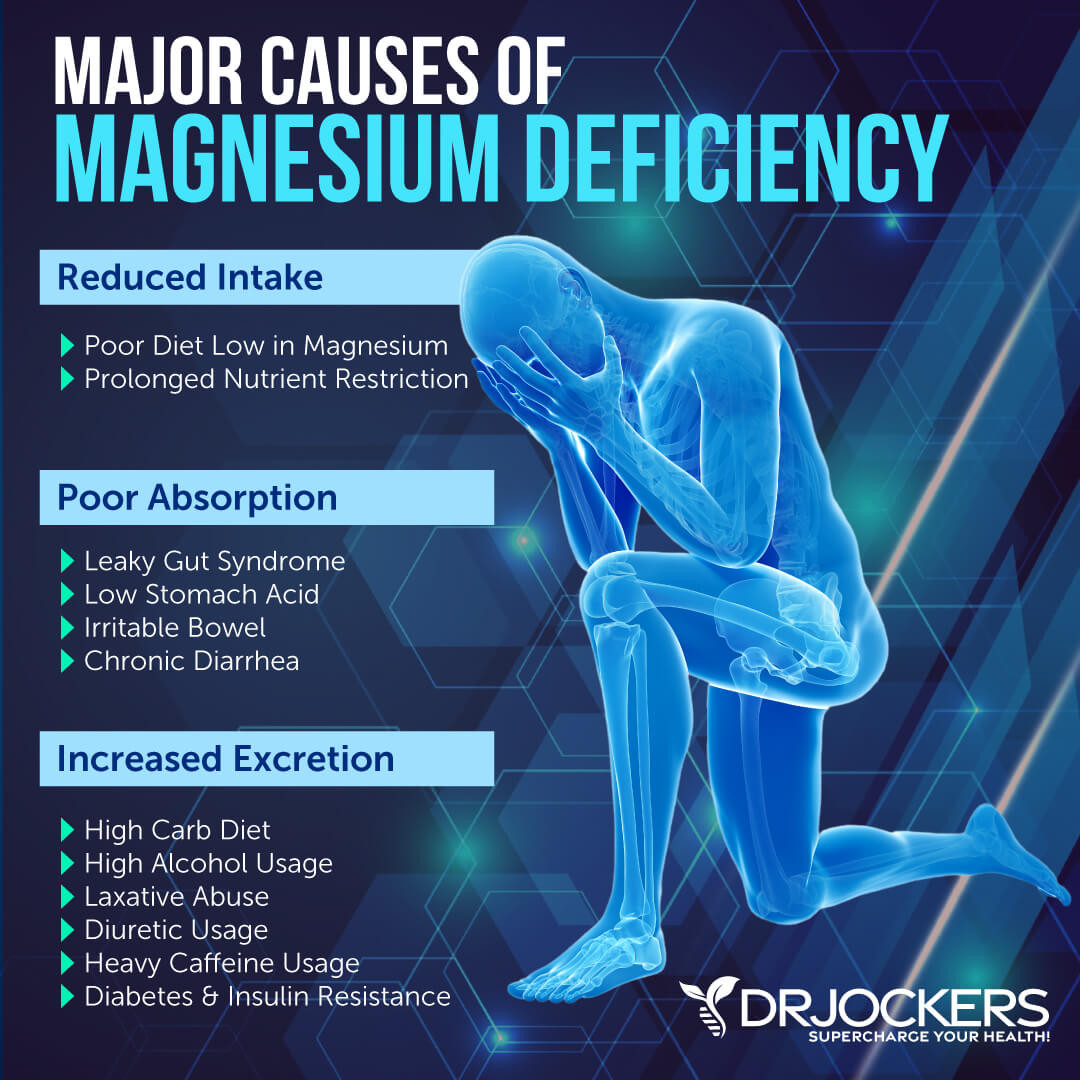
What Magnesium is Right for You?
Most magnesium supplements are most efficiently absorbed by the gastrointestinal tract and limited quantities are able to cross the blood brain barrier where it can penetrate into cells.
The body filters out up to 90% of magnesium before it reaches the cells of the body where it is needed most (7). It is important to find the proper magnesium supplements that get results.
Transdermal Magnesium:
Magnesium mineral sprays can temporarily reduce pain by becoming directly absorbed through the skin and alleviate pain entirely when used over long term periods. People experiencing symptoms of osteoarthritis can benefit from these mineral oil sprays by improving the balance of magnesium to the affected area.
Spray mineral oil daily over an affected area following a shower or before bedtime. Anecdotal evidence suggests that spraying magnesium oil over extended time duration can alleviate cramping during menstruation.
 Common Forms of Magnesium Supplements:
Common Forms of Magnesium Supplements:
Commonly used forms of magnesium supplements include magnesium oxide, magnesium citrate and magnesium chloride. Be sure to buy a pure magnesium supplement product free of other elemental compounds which may adversely affect the body.
Researchers suggest that magnesium citrate, lactate and chloride are most readily available forms of magnesium for the body to use (7).
The Benefits of Magnesium L-Threonate
The latest research indicates that magnesium L-threonate is the best form of magnesium which you could take. Unlike other magnesium compounds, magnesium threonate is capable of passing the blood brain barrier and becoming absorbed into cells (2, 3, 4).
A transport process makes the absorption of magnesium into cells extremely difficult and can often lead to inaccurate blood tests results suggesting healthy levels of magnesium. The dietary supplementation of magnesium threonate is the most highly bioavailable magnesium compound effective at increasing the concentration of magnesium inside cells.
Brain calm magnesium contains magnesium L-threonate along with other magnesium compounds designed to promote optimal magnesium support. Only magnesium L-threonate has the highest absorption rate of magnesium available for cells and may be the best form of a magnesium supplement that you could buy.
Magnesium Can Interact with Medications
Before taking on a magnesium supplementation regimen, you should first consult your doctor to see if any medications may interact with magnesium. For instance, some antibiotics have compounds in which magnesium can bind with and become insoluble (7).
Food Sources Containing Magnesium
Magnesium is a naturally present mineral found in many of the foods we should be eating which are farmed from the Earth. Without a constant replenishment of this mineral, the brain and nervous system loses ability to function properly. The recommended daily intake of magnesium for adults generally ranges from 310-420 mg (7).
The following lists of foods are excellent sources of achieving the recommended dietary dose of magnesium (1, 8). Be sure to purchase organic and non-GMO farmed foods to receive the maximum benefit from these sources. Consuming foods rich in magnesium improves brain health and energy levels.

Avoid Excessive Magnesium
Although the likelihood of excessive magnesium intake is unlikely, there are risk factors associated with magnesium intake exceeding 5,000 mg/day (7). Symptoms may include:
- Diarrhea
- Nausea
- Abdominal cramping
- Vomiting
- Irregular heartbeat
- Heart attack
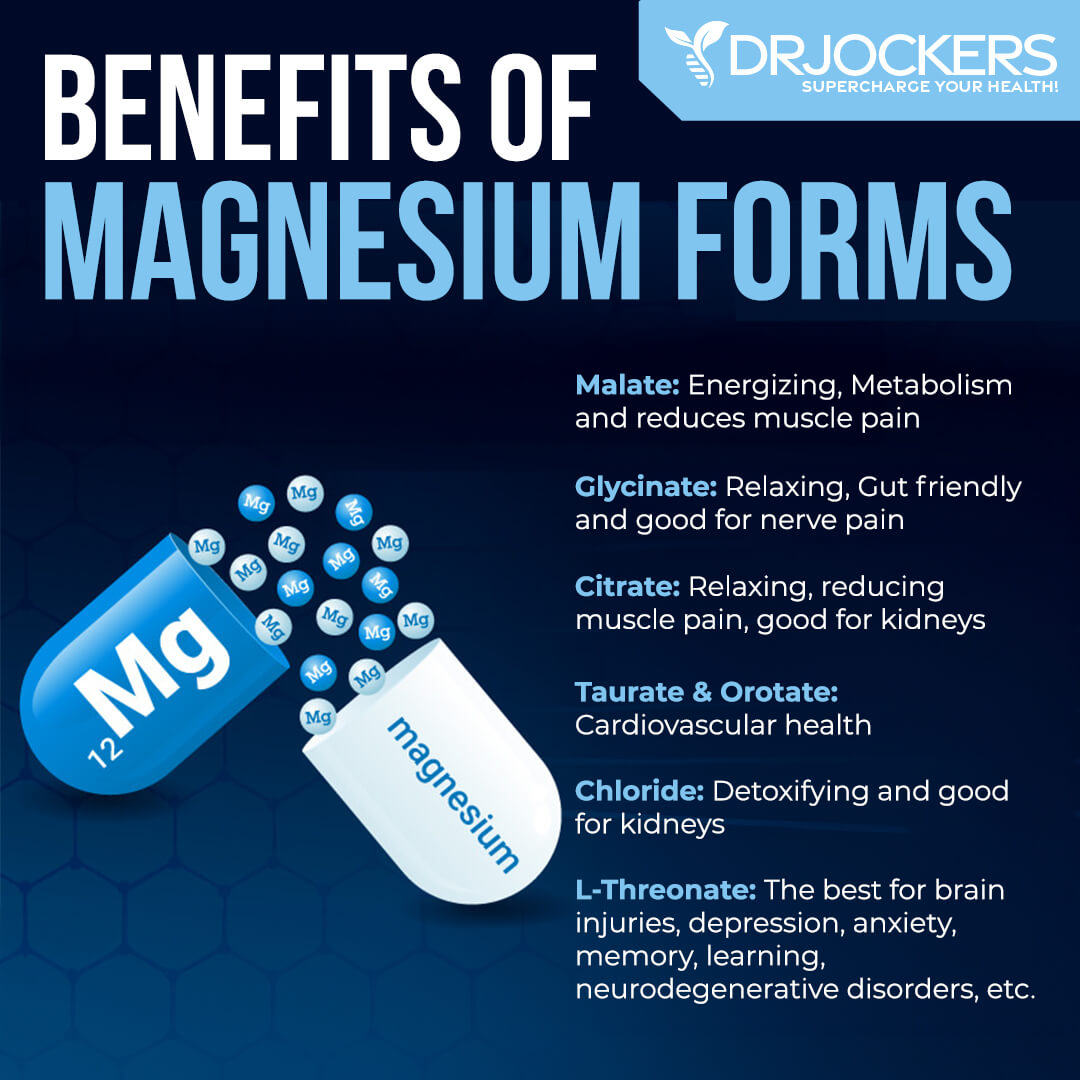
Listen to Your Body
When you are feeling tired, your brain is telling you that it needs rest and fuel. What we do instead is consume caffeine or energy drinks which burn more magnesium. Now you understand how the various ways magnesium improves brain health and can help you live better!
If you want to work with a functional health coach, I recommend this article with tips on how to find a great coach. We do offer long-distance functional health coaching programs. For further support with your health goals, just reach out and our fantastic coaches are here to support your journey.
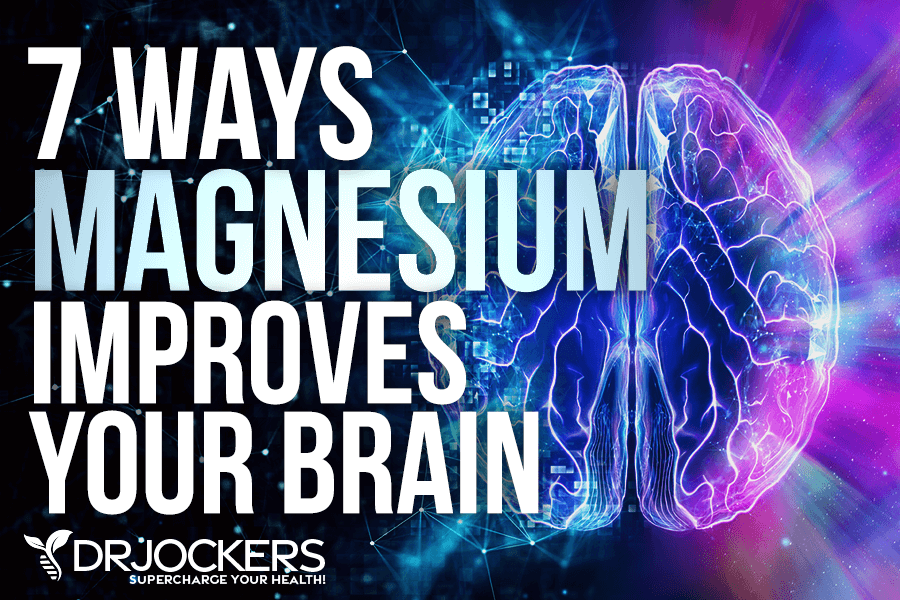
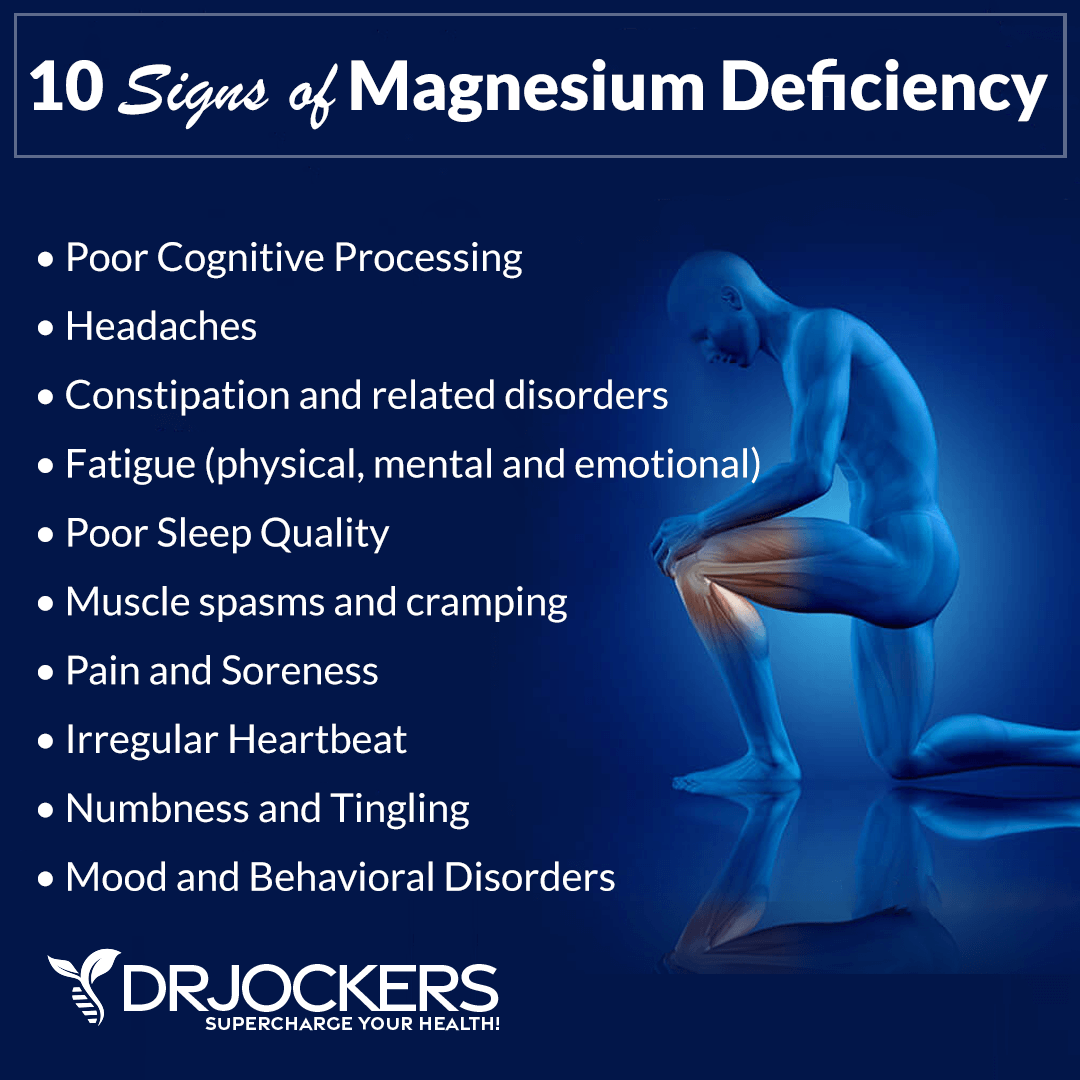
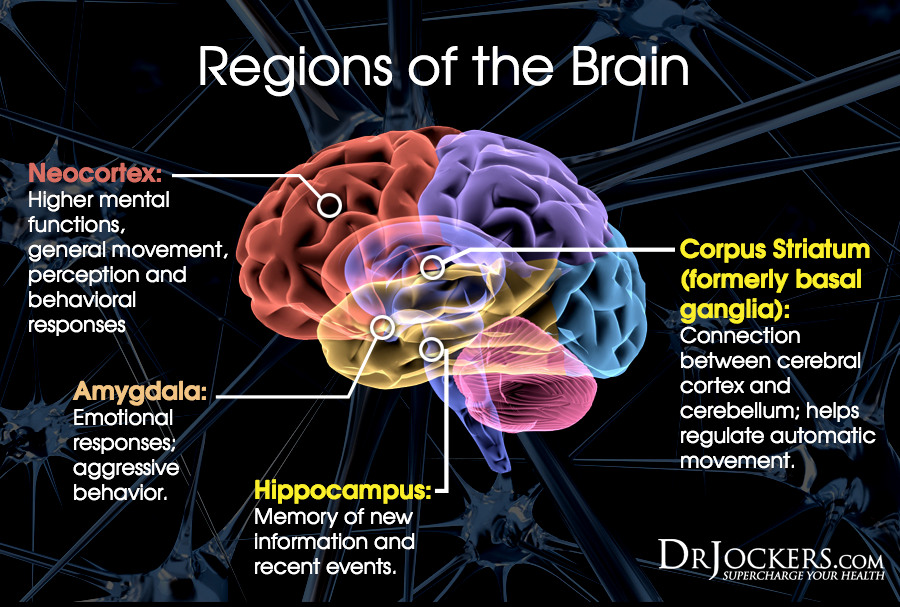





Wonderfully documented very comprehensive writing. Thanks Dr. Jockers. You are doing a great thing for those who look after their health.
I appreciate this article Dr. Jockers. You are invaluable. Keep up your great work.
Thank you for the great article. Lots of wonderful and useful information. I currently use magnesium glycinate or bisglycinate as it does not make me too “loose”. I noticed there was no mention of this form in your article. Is this an OK form of magnesium for me to take?
Yes that is a great form Carolle. You can continue to use that.
Dr. Jockers
What type of Magnesium should I use? I have inactive lupus, fibromyalgia, OA. I also have MCTD. Will magnesium be good for me, if so what kind?
So sorry to hear about your health struggles Kathleen! I would recommend doing the Brain Calm Magnesium (will help the Fibro) I have listed above and also doing Espom Salt Baths for your joints daily!
Thank you! Great article. Question: I recently began using MagFocus at bed time (https://scriptessentials.com/shop/mag-focus/) for overall brain function/health, mental clarity and improved sleep.
I also sometimes take a capsule at night containing magnesium stearate. Is it redundant to take both — or, conversely, is it a bad idea to take both? Thanks in advance!
Hey MJ,
The MagFocus is very similar to my Brain Calm Magnesium so that should be great. Magnesium stearate containing products do not contain enough magnesium to make an impact. It is just trace amounts. You can certainly take both.
Hello Dr David
Awesome information about magnesium. Can pregnant lady take magnesium? If yes, what form and dose??
Regards,
Dr Prakash
Thank you Dr Prakash! Yes, pregnant women can and often times should be taking extra magnesium supplementation. Mag malate, citrate, threonate and glycinate are all good forms for pregnancy. 200-500 mg, 1-2 x daily is great dosage!
If they get diarrhea than cut back on the dosage.
Tremendous thanks Dr David.
Thanks for the article. Any suggestion for OCD sufferers?
Hey Lola, OCD is commonly associated with low magnesium levels. I would highly recommend the Brain Calm Magnesium product for OCD and have used it successfully with 4 different OCD cases. Take 1-2 scoops in water 3-4x daily for a week while following an anti-inflammatory diet and you will notice a dramatic difference.
I have a 15 yr old who had pain from RA. She gets migraines and anxiety and is having an issue with light headed and nausea and sometimes passes out. Her Drs. are of no help since it isn’t a blood sugar issue. Do you think magnesium would help her?
Has* pain from RA.
Paula,
I am SO SORRY to hear about your daughter! Yes, I absolutely would start by getting her on a good magnesium. I would recommend the brain calm magnesium I discuss in this article as it has proven ability to cross the blood brain barrier, reduce stress hormone in the neural tissue and restore neurochemical balance in the brain.
Have your house tested for mould. I had many of those symptoms when living in a mouldy house.
so you mentioned herbicides and pesticides in coffee..and after watching 100’s of hours of videos.. the best i got was that apple cider vinegar binds to glyphosate and in the gut..but wouldn’t getting it out before consuming be better? so i was discussing with a brother in Christ about water filters..so he went and researched and returned to me saying that there is this ozone making machine which accomplishes what i have mentioned..so i went berserk, and went to aliexpress and ordered different samples..one is used in the refrigerator to kill off bacteria and remove odor and prolong the shelf life of food, can also be put in the shoe cabinet to remove the stinch, or with clothes if they are not colorful to terminate the flees…and on saturday, finally, a bigger noisy unit arrived and it promises to remove the herbicides and pesticides form vegetables and fruits, it also removes the antibiotics in meat and releases the nutrients in them, and speaking of mold, it removes that with a 100% rate, also exterminates the formaldehyde gases emitted by new furniture! i tried it on tomatoes..of course it didn’t change the taste, but i can now not peal peaches for example..of course the tomatoes i ate from the garden in the summer are like nothing i ate before.. and all my guests who tried them agree!
Wow! That is great to hear Vacheslav. Thank you for sharing!
Hi Doctor David, love that I came across this article. I’m always looking into Functional Medicine and ways to help out my wife (33 years old, 2 kids, and we eat all organic diets and non-dairy products due to her sensitivity with her face breaking out from anything dairy) but mostly her migraines. I know Magnesium can help in this regard but which form or type and how much should she take?
She’s tried this method in the past when we trialed “Migreleif” supplements but diarrhea was a constant problem so she stopped. How do we alleviate this issue so she can get back on Magnesium?
Will Magnesium also help her chronic joint pain in her knees? She tends to get these pains around the springs/summers here in Washington D.C. where we live. Thank you so much!
So sorry to hear about your wife! I would highly recommend the brain calm magnesium. Ultimately she may need a full anti-inflammatory program such as the autoimmune elimination program here to fully resolve these issues. https://drjockers.com/autoimmune-elimination-program/
i read that migraines are a result of vitamin b2 deficiency if i am not mistaken but for sure vitamin B, also i read that acupuncture helps with that, as for the joints, the problem is best got rid off but consuming sulfur daily..it detoxifies of heavy metals, stimulates the brain, increases energy and is the enzyme to restore joints and much more..accompany that with collagen for restoration!
Hey Vacheslav, Yes, nutritional deficiencies in vitamins B2, B12, folate, vitamin D can result in migraines as well. I detail other major causes in this article.
Is Mg citrate good for Ocd ? and what should be the Daily Dose? ?
Thanks.
Jay
Hey Jay, I would recommend our Brain Calm Magnesium with magnesium threonate. Take 1 scoop – 2x daily in water and see how you do with that. https://store.drjockers.com/collections/top-sellers/products/brain-calm-magnesium
How much absorbable mag do u need to rub on. If I take internally I get loose stool. Should u take both. Blood pressure is a little high. I take bystolic and amlodipine. Is taking internal better for bp or is absorbable ok.
JP,
If you are having GI discomfort with internal use you could try the transdermal magnesium as it works very well for most people rubbed onto the abdomen. You could try this one https://store.drjockers.com/products/magnesium-oil-ultra-msm
when i was meatless, one nice effect was low blood pressure, so check it out!
Thanks for sharing Vacheslav!
Dr. Jockers, your articals and info graph are very well written, documented and up to date. Thank you so much for all you do to help your readers!
Thank you for reading them Carolyn!
Hi Dr. Jockers,
I have learned that magnesium chloride oil als passes the brain barrier, but I understand
from you that that is not true?
Your answer will be appreciated.
With kind regards,
Ricka
Hey Ricka, to my knowledge magnesium L-threonate is the best for getting magnesium through the blood brain barrier
Does magnesium obtained naturally from food (as opposed to supplemental magnesium) pass through the blood brain barrier?
Hey Bobbi, it is likely that some amount of dietary magnesium ends up in the brain since it is required for proper ATP function. However, I find that it is very difficult with today’s food supply to consume enough food-based magnesium even to support healthy levels in the body. As for the brain, this is why I highly recommend supplementation, especially with L-threonate.
What form of magnesium occurs in food? I would much prefer to get magnesium (and all other nutrients) as naturally as possible (in as natural a form as possible, and preferably in food). If it is deficient in our food supply, is there a supplement form of magnesium that is the same form as that in food? The L-threonate option sounds interesting, but as it is synthetic and hasn’t even been around very long, I am a bit hesitant. So I’d like to continue to explore a more natural approach (IF one is available) before resorting to a synthetic approach.
Thank you for your feedback!
Hey Bobbi, good question. A good form of naturally occurring magnesium would be magnesium chloride which is in our topical forms of magnesium like this one: https://store.drjockers.com/products/magnesium-oil-ultra-msm. It can also be purchased for soaking: https://amzn.to/2hjlp6h
Hi Dr Jockers
I hv avm in left brain, bleedg fm aneurysm, undergone 2 rounds of radiotherapy to shrink avm. Now condition stabilised, taking medications propranalol daily for headaches n sleep. Do u think I can try magnesium l threonate supplements? I am worried it may give me more headaches. Your reply is much appreciated.
Hey Nancy, there would be no harm in trying it starting with one scoop a day.
Is there any advantage of the powder form of Brain Calm Magnesium over capsule form?
Yes the powder form is easier for the body to absorb than the capsule form when it comes to magnesium.
Any chance, that Brain Calm Magnesium will help with muscle cramps associated with Donepezil 10 mg?
I have a lot of the symptoms that are associated with the above and I do not know how to take magnesium how long do you take magnesium to let it build up to the optimal level
I personally take it every day and recommend the same for almost everyone!
Hi Dr,
I suffer from anxiety, depression and OCD. I had traumatic experience in the past. Currently taking anti depressant. Is there anything you can recommend? I want to take holistic approach so looking for something natural. Thank you very much..
Hey Gary, you will likely want to work with a trauma specialist for this. Healthy dietary and lifestyle strategies can help as well, you can email our health coach Michael at michael@drjockers.com if you are interested in putting together a plan!
I’ve been taking magnesium for a while now and one of the other benefits that I’ve noticed is that it stopped my restless leg syndrome. What do you think of EarthWater featuring… “Fulvic Acid” a substance vital to human health? Thanks for your input.
I think fulvic acid is great Dianne! Glad to hear you are feeling the difference!
How much magnesium and what type is needed for someone dx’d with mild cognative dementia?
2 scoops of this one separated by several hours would be a good strategy: https://store.drjockers.com/products/brain-calm-magnesium
with high doses of fish oil or even better krill oil..and throw out the sun flower oil and use coconut oil instead also take several spoons of it daily
Hello Dr Jockers, Can’t praise magnesium highly enough -it’s wonderful stuff. Started firstly with the oxide, but wondered about getting the runs. Changed to glycinate which was fine initially, but had joint pain. Am now taking MSM and the difference is amazing. There is occasional pain but with gentle exercises such as the cat-cow stretch, I’m doing OK.
Thanks for such an informative site. All the very best to you.
Great to hear that Susan! Blessings to you!
My mother just turn 93. I put her on Mg 200 mg/day. She is already feeling a lot better, getting a lot more mobility, clearer mind, etc. What is the maximum dose for her age ? Thanks
Great to hear that! You can do up to 1.5 grams/day or until she hits bowel tolerance (loose stools) and then back down.
Can I take a low dose of magnesium citrate with magnesium L-threonate? I have diverticulosis and have constipation concerns.
Yes you can!
Hi Dr. Jockers,
This is a really great article! I started experiencing severe ADHD symptoms (and much brain fog) about a year ago. I tried stimulants and none of them helped. Do you think braincalm alone could be a good alternative (other than exercise, sleep, good diet, water, etc?) or what can I pair it with for the best results?
Hey Stephanie, Yes, Brain Calm Magnesium can help. Adapt Strong and Dopamine Plus are also helpful supplements for mental clarity and focus.
Thank you for the golden information.
You’re welcome Patrick!